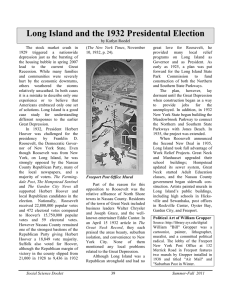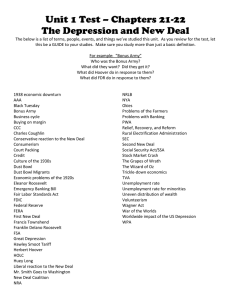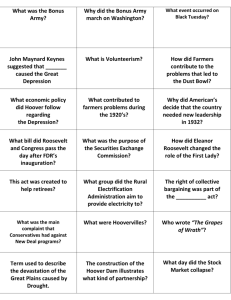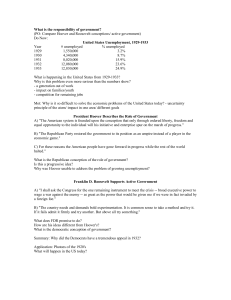1932
advertisement
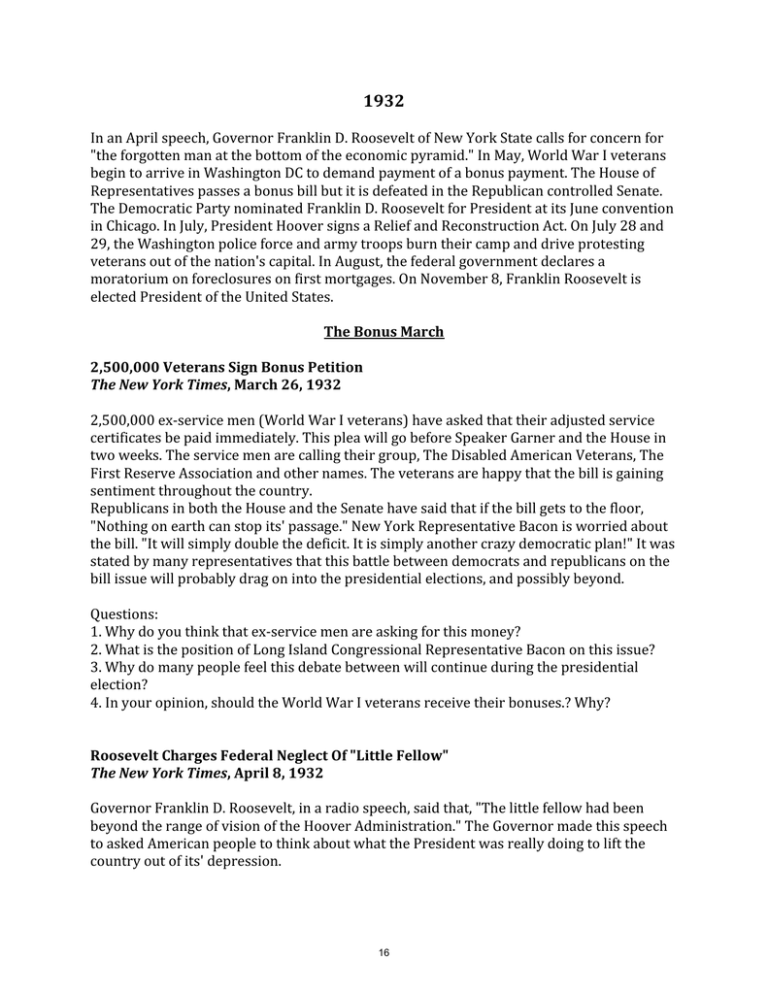
1932 In an April speech, Governor Franklin D. Roosevelt of New York State calls for concern for "the forgotten man at the bottom of the economic pyramid." In May, World War I veterans begin to arrive in Washington DC to demand payment of a bonus payment. The House of Representatives passes a bonus bill but it is defeated in the Republican controlled Senate. The Democratic Party nominated Franklin D. Roosevelt for President at its June convention in Chicago. In July, President Hoover signs a Relief and Reconstruction Act. On July 28 and 29, the Washington police force and army troops burn their camp and drive protesting veterans out of the nation's capital. In August, the federal government declares a moratorium on foreclosures on first mortgages. On November 8, Franklin Roosevelt is elected President of the United States. The Bonus March 2,500,000 Veterans Sign Bonus Petition The New York Times, March 26, 1932 2,500,000 ex‐service men (World War I veterans) have asked that their adjusted service certificates be paid immediately. This plea will go before Speaker Garner and the House in two weeks. The service men are calling their group, The Disabled American Veterans, The First Reserve Association and other names. The veterans are happy that the bill is gaining sentiment throughout the country. Republicans in both the House and the Senate have said that if the bill gets to the floor, "Nothing on earth can stop its' passage." New York Representative Bacon is worried about the bill. "It will simply double the deficit. It is simply another crazy democratic plan!" It was stated by many representatives that this battle between democrats and republicans on the bill issue will probably drag on into the presidential elections, and possibly beyond. Questions: 1. Why do you think that ex‐service men are asking for this money? 2. What is the position of Long Island Congressional Representative Bacon on this issue? 3. Why do many people feel this debate between will continue during the presidential election? 4. In your opinion, should the World War I veterans receive their bonuses.? Why? Roosevelt Charges Federal Neglect Of "Little Fellow" The New York Times, April 8, 1932 Governor Franklin D. Roosevelt, in a radio speech, said that, "The little fellow had been beyond the range of vision of the Hoover Administration." The Governor made this speech to asked American people to think about what the President was really doing to lift the country out of its' depression. 16 Roosevelt said that this crisis was "more grave" to the nation than entering the Great War in 1917. Comparing Hoover to Napoleon on how both treated the "little people," Roosevelt said that Washington, "has either forgotten or does not want to remember the infantry of our economy army." Roosevelt ended his speech by saying that depression relief must go to the "forgotten man" on the bottom of the economic pyramid first and then other problems can then be solved. Questions: 1. Who are the "little fellow" and the "forgotten man"? 2. How does Governor Roosevelt challenge President Hoover in this speech? 3. Do you agree with Governor Roosevelt? Why or why not? Parade To Capitol In Plea For Bonus The New York Times, April 9, 1932 More than 1,200 veterans marched to the capitol steps yesterday in a demonstration to Congress for passage of a $2,600,000,000 bonus bill. The veterans were armed with petitions filled with 10‐600 names each. The petitions supposedly included some 2,240,000 names including 199,904 names from New York State. The mass meeting was orderly, and the 500 policemen called in were not needed. Representative Rainey, head of the House Ways and Means Committee, accepted the petitions with "great pleasure". Questions: 1. Why did the veterans march to the capitol building in Washington DC? 2. In your opinion, why does the New York Times article say that "The petitions supposedly included some 2,240,000 names"? Weary Bonus Army Reaches Capitol By Truck The New York Times, May 30, 1932 With American flags with them, sixteen truckloads of war veterans arrived at the capitol vowing to remain in Washington until Congress pays them their bonuses in full. Weary, hungry, and dirty from their trek, the former soldiers had hitchhiked to the capital. They were not given trucks until they got to Maryland. Many had hitchhiked, including 330 from the Pacific Coast, and they were surprised to find food and coffee waiting for them. There was no shouting or demonstrations as the soldiers went to buildings where they will be allowed to sleep. It is estimated that as many as 3,200 veterans are in these buildings waiting for Congress to pay their bonuses. Questions: 1. Why are veterans camping out at the Capitol building in Washington DC? 2. In your opinion, why are the veterans displaying the American flag? 17 Veterans Here Off To Capitol As House Forces A Bonus Vote The New York Times, June 5, 1932 500 Veterans from New York began their march to the capitol to demand their bonuses, but were forced to stop in Elizabeth, New Jersey when their plea for a free train ride was rejected. Police have said that they believe some of the marchers from New York might be Communists. Some of the marchers had started the march from Union Square in New York City under the auspices of the Workers' Ex‐Service Men's League, an organization believed to have Communist leanings. Other marchers, believed to be "American", were from Brooklyn, and met up with the alleged Communists along the way. While both groups claimed that they were all good Americans, the group from Brooklyn went on to say, "We are going to Washington to demand our bonus. We don't want to have anything to do with the 'other' fellows." Questions: 1. Why are the New York veterans having difficulty getting to Washington, DC? 2. Why are the police suspicious of some of the New York marchers? 3. In your opinion, does it make a difference if some of the marchers believe in communism? Explain your views? City Bonus Hikers To Get Fare Home The New York Times, June 11, 1932 Governor Roosevelt has said he will provide railroad transportation out of the "bonus army" camp for bona fide residents of New York City stranded in the capital. A $1,000 donation was given anonymously to help veterans of New York City return home. Roosevelt said this and other donations will help 800 New Yorkers come home. Questions: 1. In your opinion, why is Governor Roosevelt making this announcement? 2. Do you think the veterans will accept this offer? Why or why not? Bonus Bill Passes In House, 209­176: Senate To Rush Vote The New York Times, June 16, 1932 The House passed the Patman Bill yesterday, which is expected to give $2,400,000,000 to pay the rest of the soldier's benefits. The vote was then sent to the Senate. The Bonus marchers cheered when they heard of the vote. The bonus certificates will not become due until 1945 which has angered some of the veterans. Many in the House said that they are doubtful whether the bill will pass the Senate, or be approved by President Hoover. The President has let many know that he will not approve the bill. Fifty‐six Senators are reportedly backing the President's veto, which would help block the bill from passing the 18 Senate. Those who favor the bill are hoping that the President, "will not dare" veto this measure if he hopes to win the election in November. Activity: Write a letter to President Hoover. Explain your views on the veteran's bonus bill. Senate Defeats Bonus, Despite 10,000 Veterans Masses Around Capitol The New York Times, June 18, 1932 The bonus bill to issue $2,400,000,000 in new currency to past War veterans was defeated in the Senate last night by a vote of 62‐18. Many present said it was the tensest day in Capitol history since the World War. Tensions rose as the vote was announced, and for the first time, the bonus army seemed to get out of hand. Commander‐in‐Chief Walters appealed to the men to return to their encampments, while others appealed for the men to rally. While the announcement of the vote first stunned the veterans into silence, they were soon yelling and were reluctant to leave the Capitol steps. Some feared that they would be told to go back home. Many of these unemployed men have no homes to go back to. The veterans began planning their next move which included bringing pressure on the Democratic National Convention to make the Bonus payment issue a major part of their campaign. Authorities are worried about the veterans staying in the capitol, and worry about violence against the Senate now that the vote is known. Questions: 1. How did the defeat of the bonus bill affect the veterans? 2. Why do some of the veterans have uncertain feelings about returning home? 3. In your opinion, will the defeat of the bonus bill lead to violent protests? Why or why not? Editorial: The Bonus Vote The New York Times, June 19, 1932 For the "Bonus army", the vote of the Senate means defeat. These man have neither work nor money, and with blind faith alone, the have thrown themselves at the mercy of Congress. They feel it is the government's duty and obligation to pay them the honest money they are due. Congress is not fulfilling their duties. Questions: 1. Is the writer of this editorial sympathetic to the veterans? 2. In your own opinion, is the government supposed to take care of people? Explain. 19 Nassau Legion Votes For Bonus The Farmingdale Post, July 29, 1932 The Nassau County American Legion held its fourteenth annual convention last Saturday. Among resolutions adopted by the 200 delegates were the repeal of the 18th Amendment and the passage of the bonus resolution. The bonus resolution precipitated a lengthy argument but finally was adopted by a vote of 157 to 37. Moses G. Hubas, State commander, who has been booed at previous county appearances when he spoke in opposition to bonus legislation, was greeted with silence when he urged Legion members not to, "injure" the country with their actions. This was taken to mean that the members should not seek the passing of the Bonus Bill. Questions 1. How do Nassau County veterans feel about the bonus bill? Explain. 2. Why does Moses Hubas think that the bonus will injure the country? Suffolk Veterans Oppose Cash Bonus The New York Times, July 31, 1932 The Suffolk American Legion Convention, held in Port Jefferson L.I., went on record as saying that they are opposed to the immediate payment of the bonus to veterans. This vote was not unanimous by any means, as many from Bay Shore and Brentwood were in favor of immediate payments. A roll‐call was needed in order to settle the question. The final vote opposing the payment was 89 to 58. While a few delegates referred to the bonus marchers in Washington at this very moment, the majority of delegates were determined to keep quiet on the subject, and the discussion was dropped. Questions: 1. In your opinion, why was the Suffolk meeting divided on the bonus bill? 2. In your opinion, why did the majority of the delegates remain silent on events in Washington? Troops Drive Vets From Capitol, Fire Camps There And At Anacostia The New York Times, July 29, 1932 As flames rose from the Anacostia flats, veterans left the area that had been their home for the past two months going they knew not where. Cavalry stood guard on the bridges leading to the camps to make sure all were leaving. The veterans were being forced to leave on behest of the military forces of the government, summoned by President Hoover himself. The President said he had to do this because confrontations had begun between bonus marchers and the police. Many of the marchers were believed to be Reds and this is what sparked the riot with police. One marcher was left dead as a result. Tear gas, guns, and fire were all employed to rid the shantytown of bonus marchers. President Hoover said this was necessary. Hoover also said that many of the marchers probably did not know that 20 they were sharing quarters with violent Communists with criminal records. He stated, "The veterans amongst these numbers are no doubt unaware of the character of their companions and are being led into violence which no government can tolerate." Questions: 1. What happened to the bonus marchers? 2. According to President Hoover, why were the bonus marchers forced to leave the capitol? 3. In your opinion, did the charge of communist influence justify what happened? Explain. 4. How do you think these events will affect the presidential election? Why? The 1932 Presidential Election Republicans Gain In Nassau County The Farmingdale Post, March 25, 1932 Figures from last year show that there are twice as many Republicans as Democrats registered in Nassau County. This indicates what may be confidently expected at the election next November. The Town of Hempstead made a record gain of 4,856 Republicans against 2,696 Democrats. Although mostly Democrats were elected to office in Glen Cove City, 233 more Republicans than Democrats registered there in 1931. This shows a remarkable Republican majority for the Presidential candidate next fall. The County wide situation therefore, is extremely favorable for a long continuance of the sane, high‐type government which justifies Nassau's reputation as the 'Banner County.' Republican power in Nassau County will lead to greater and more intelligent activity from Committeemen, as Republicans know what is needed for our residents. This is most evident when people move from the city to our county and change their political affiliation on arrival to Nassau with a "sweet reasonability seldom so apparent in other places." Questions: 1. Which political party has the most supporters in Nassau County in 1932? 2. What do you think the article means when it credits Republicans for "the sane, high‐type government which justifies Nassau's reputation as the 'Banner County'"? 3. In your opinion, what does Nassau's continuation as a Republican stronghold suggest about the impact of the Great Depression on the people of Long Island? Explain. Democrats See County Gains The Farmingdale Post, April 22, 1932 Philip N. Krug, chairman of the Nassau Democratic Committee, predicted that Nassau would go to the Democratic column this fall in the Presidential election. He compared this situation to what happened in Brooklyn twenty years ago. Although Krug admitted that Nassau is "The banner Republican county at the moment", he predicted that the banner would shrink to the proportion or a pennant in November. 21 Questions: 1. What do the Democrats expect to happen to the Republicans in the fall 1932 election? 2. In your opinion, why are the Democrats optimistic about the possibility of change? Nassau G.O.P. Party to Attend Convention The Farmingdale Post, June 3, 1932 Nassau County Republicans who would like to attend the convention at Chicago, the week of June 14th, are invited to make reservations with Mrs. Frank E. Brown without delay. The party will leave New York at 6 o'clock on Monday June 12th and return the following Saturday. Once in Chicago, the Nassau Republican delegation will stay in The Hotel Morrison. The party will return through the picturesque Ohio Valley, and then come down to Long Island through Buffalo. The scenery viewed from the train is most rugged and beautiful. Question: In your opinion, why is the Republican Convention described in this way? Roosevelt Puts Economic Recovery First In His Acceptance Speech The New York Times, July 3, 1932 After serving nearly 30 years in the Senate, Speaker of the House John Nance Garner, was nominated as Democratic Candidate as Vice President of the United States. The noisy convention who for the first time were in complete agreement on Garner's nomination, cheered as the vote made it official. Garner stated that instead of splintering apart as Republicans predicted, the Democrats remained strong and by naming Franklin D. Roosevelt for President, "have chilled the heart of every Republican in the United States." The floor of the convention in Chicago erupted in cheers at this statement. More and more people are joining the Democratic camp because they feel it is the where real progressive leadership awaits them. Many predicted that Roosevelt and Garner will lead the Democratic party to the greatest victory it has ever achieved. Roosevelt flew to Chicago to accept the nomination after Garner's speech. Many questioned why the Governor used an airplane to get to the convention. Roosevelt said he did it to, "bring forward the idea of getting the campaign started. I believe that there are votes to be made in July." Questions: 1. Why are the Democrats enthusiastic about the nominations of Roosevelt and Garner? 2. Why did Roosevelt use an airplane to travel to the convention? 3. In your opinion, why are Americans interested in Progressive leadership? 22 Vunk Appointed Supreme Court Judge The Farmingdale Post, July 15, 1932 Former County Judge John R. Vunk, of Patchogue, has been appointed by Governor Franklin D. Roosevelt as a Supreme Court Judge to fill the vacancy left in the wake of Justice Lewis J. Smith's demise. The appointment of Justice Vunk gives Suffolk County three representatives in the Second Judicial District, as compared to two from Nassau. In the selection of Vunk, political observers saw the first effects of the distribution of patronage of the failure of Tammany Hall and its allies to support Mr. Roosevelt for the presidential nomination in the Chicago convention. Suffolk County alone among counties in the Second Judicial district remained loyal to the Roosevelt standard. Questions: 1. Who is John Vunk? 2. According to the article, why was a representative from Suffolk County appointed to the New York State Supreme Court? Governor Roosevelt's Radio Speech The New York Times, July 31, 1932 Governor Roosevelt has promised relief for the unemployed in his latest radio speech. Roosevelt said we must save in one place, what we would spend in others, or we must acquire funds through taxation. He said that a government like a family, can spend more than it earns for a year, if it will help the family, but it can not continue, otherwise we will all wind up in the poor house. While the Republican government believes that relief and help is a local responsibility, the Democrats are keeping an eye on actual human needs. We will use human welfare, especially for the protection of our children. The Democrats would give Federal credit to the States to provide unemployment relief wherever it is needed. The States finances are so diminished that without this help, they can not provide for the needy. Roosevelt said more jobs could be provided by a reduction in hours or labor. He also encouraged that shorter hours be required for workers each week. Questions: 1. According to this article, what is the major difference between Democrats and Republicans? 2. How will Governor Roosevelt help the unemployed? 3. Write a letter to the editor of the New York Times explaining your views on Governor Roosevelt's radio address. Democrats Name C.V. Whitney for Ticket as L.I. Congressman The Farmingdale Post, August 19, 1932 Cornelius Vanderbilt Whitney, millionaire sportsman and aviator, will be the Democratic nominee for Congress in the First District. This was announced by Philip N. Krug, Nassau 23 County Democratic leader. Vanderbilt phoned in his acceptance of the nomination from his summer estate in Northern New York. Mr. Whitney, known as Sonny, has one of the most famous racing stables in the country. His stable is estimated at over $2,00,000. Mr. Whitney inherited half of his father's estate which in 1930 was valued at $194,328,154. Mr. Whitney is happily married to his second wife Gladys Crosby Hopkins. Mr. Whitney has a great interest in aviation. He is the director and a member of the Aviation Club at Hicksville. Questions: 1. What is your reaction to this article about Mr. Whitney? 2. Why do you think the Democrats nominated Whitney? Work and No Fireworks ­­ Editorial The Farmingdale Post, September 23, 1932 Work, services beyond the call of duty, and devotion to the public good when a man is a candidate for office, means that he has less time for advertising himself with speeches, trips, and the usual fireworks of a campaign. Such is the case with President Hoover and Congressman Bacon. Both are workers and unselfish workers. The voters for the most part know this and will respect them the more for attending to the public job during these times. Questions: 1. What is the main point raised in this editorial? 2. In you opinion, which candidate for President will The Farmingdale Post support in the election? Why? Hoover's Address ­­ Editorial The Farmingdale Post, October 7, 1932 All who heard the address delivered at Des Moines by President Hoover on Tuesday night were thrilled by his masterly presentation of the national issues. He not only covered the facts without theory, but he gave a candid exposition of what the country must expect without exaggeration or false hopes. The contrast with the recent Western trip of the Democratic candidate of pretense and promise was obvious. He said, "I come to you with no economic patent medicine especially compounded for farmers. I refuse to offer counterfeit currency of false hopes." Questions: 1. What is the main point raised in this editorial? 2. In you opinion, is The Farmingdale Post giving unbiased coverage to the Presidential campaign? Why do you take this position? 24 Bacon Sees That Tide Has Turned The Hempstead Sentinel, October 13, 1932 "The tide has turned, and business is on the road to recovery under the guidance of President Hoover," Congressman Robert L. Bacon told 400 persons in Utowana Hall, Hempstead, Tuesday night at a meeting arranged by the Union Republican Club of Nassau County. The speech of the President at Des Moines last week has cleared up for the country misunderstanding of problems," said Mr. Bacon, and he declared, "this is no time for a change and the election of a Democratic and untried President would only prolong recovery. Questions: 1. Who does Congressman Bacon support in the Presidential election? 2. According to Congressman Bacon, why should his candidate be elected? 3. In your opinion, why does Congressman Bacon say "the tide has turned"? Leader States Republican Sentiment Growing Throughout N.Y. State The Farmingdale Post, October 14, 1932 Republican sentiment is gaining great strength throughout New York State. It is growing strong especially in areas where Democrats have been gaining a majority. This was declared by James L. Dowsey, The Republican leader of North Hempstead, after returning from his upstate summer house where he met with several prominent state Republicans. "I have talked with scores of Democrats and Republicans over the last few weeks, and they all believe that the Republican ticket will be victorious on a state and national level this November", Dowsey reported. Dowsey says many Republicans are seeing a trend toward Republican candidates, especially for one who could replace Governor Roosevelt when he retires from public life, December 31. Republicans all over New York State believe that their time has come to lead this country to greatness for many years to come. Questions: 1. Who is James Dowsey? 2. What does Mr. Dowsey believe will happen in the 1932 election? Re­election of "Iron Man" Bacon Seen By Friends The Garden City News, October 19, 1932 Representative Robert L. Bacon of Westbury, seeking re‐election in the First Congressional District, embracing Nassau, Suffolk, and a portion of Queens, is well earning his title of "Iron Man" of Republican national, state, and county activities through the vigorous campaign he is waging for re‐election....During the first three weeks of the campaign, Mr. Bacon has spoken at sixty‐two meetings attended by approximately 20,000 voters. "I never felt better in my life," Mr. Bacon said, "nor did I ever feel surer of Republican success." Question: In your opinion, what does strong support for Republican Congressman Bacon suggest about the direction Long island will take in the Presidential election? Why? 25 Republican Rally in Farmingdale The Farmingdale Post, October 21, 1932 On Thursday evening, November third, a big Republican rally will be held in Farmingdale at St. Thomas' Parish Hall. Residents, no matter what their political affiliations may be, will be welcome to attend and hear the candidates speak. Many prominent Republicans are expected including Congressman Bacon and nominees C. Walter Randall and Harry Hedger. A motor caravan parade through the main streets of Farmingdale will precede the speeches. Hicksville and other towns are planning rallies as well. Question: Why are big Republican rallies being held in Farmingdale and Hicksville? Ford Urges Election of Hoover ­ Editorial The Farmingdale Post, October 21, 1932 Bulletin Boards of the Ford Motor Company and at the executive offices at Dearborn displayed the following notice this week. "The Ford Motor Company is not interested in partisan politics. We do not seek to control any man's vote. We feel, however, that the coming election is so important to industry and employment that our employees should know our views. President Hoover has overcome the forces that almost destroyed industry and employment His efforts to start the country back to work are beginning to show results. We are convinced that any break in the program would hurt industry and employment. To prevent times from getting worse and to help them get better President Hoover must be elected." Questions: 1. According to this editorial, who is endorsing President Hoover's reelection campaign? 2. Why are they supporting Hoover? 3. In your opinion, why is The Farmingdale Post printing this endorsement? The Coming Election ­ Editorial The Hempstead Sentinel, November 3, 1932 It is not surprising that registration is extraordinarily heavy in Nassau County, or that it is far in excess of the 1931 registration, and that it exceeds by a large volume the 1928 Presidential registration. Eight years ago in the Coolidge‐Davis Presidential election, the Republican nominee polled approximately 45,000 votes and the Democratic nominee approximately 14,000 in the County. Four years later in the Hoover‐Smith race, Hoover polled 71,000 and Smith 40,000. The national situation is somewhat different this year, and there is a considerable cross current of opinion, that may mean a cut in the Republican vote, nationally. It seems beyond the realm of probabilities that Nassau County, normally heavily Republican is going to make a complete reversal of its voting strength. Questions: 1. What is happening as election day approaches? 26 2. What has happened in Nassau County in recent Presidential elections? 3. What does The Hempstead Sentinel believe will happen in this election? Hoover­Donovan­Davison­Bacon Banner headline, The Farmingdale Post, November 4, 1932 Question: In your opinion, why is The Farmingdale Post running a banner headlining listing the Republican candidates for national, state, and local offices? Nassau County Holds To Republican Front In Terrific Upheaval The Hempstead Sentinel, November 10, 1932 Nassau County continues in the Republican column despite the record breaking political upheaval that swept the nation Tuesday. Faced with an unprecedented Democratic drift, Nassau County not only gave Hoover a lead in the County of 18,849 but returned to office, Congressman Robert L. Bacon and Assemblyman Edwin W. Wallace by almost the same majorities they received in the election of 1930. The Republican forces carried for Hoover the three Townships of Hempstead, North Hempstead and Oyster Bay, but lost the Cities of Long Beach and Glen Cove. Questions: 1. How did Nassau County vote in the Presidential election? 2. In your opinion, why did Nassau voters go against the national trend? Roosevelt Pledges Recovery First, Says His Victory 'Transcends' Party Lines The New York Times, November 10, 1932 Governor, now President‐elect, Roosevelt spoke at Hyde Park to reporters saying that his election was a victory for liberal thought in the country. He pledged to assume leadership in a fight to lift a nation from the economic depression. With a win in 42 states, the President‐elect said he was hopeful that he could rebuild the nation's economic forces in a rapid style. Roosevelt also said that his semi‐landslide win transcended party lines. He said that his election shows that the American people firmly believe, "that there is great and actual possibility in an orderly recovery, through a well‐conceived and actively directed plan of action." Roosevelt said he was happy to see unbounded confidence in the nation for the future of sound agriculture and honorable industry. Questions: 1. What does Roosevelt believe his election is a victory for liberal thought in the country? 2. Why does Roosevelt feel he has a mandate for action? 3. Do you agree with Roosevelt that an orderly recovery from the depression is possible? Explain. 27 Nassau County Stands Steady While Nation Chooses New Deal The Farmingdale Post, November 11, 1932 Nassau County remained the banner of a Republican stronghold while the rest of New York and the nation elected Franklin D. Roosevelt as president in a Democratic landslide, over incumbent President Herbert C. Hoover. Roosevelt lost in Nassau County by thousands of votes, but won Suffolk County handily. While all local Republicans won their elections here including Robert L. Bacon over Cornelius Vanderbilt Whitney, the Democrats now control the State Senate by one person. This will be in effect for the next two years. Questions: 1. How did the Republican Party do in Nassau County in 1932? 2. In your opinion, why did Nassau County voters defy the national trend? Wallace Blames State's Plight On Roosevelt Regime The Farmingdale Post, February 24, 1933 Assemblyman and Nassau County Republican leader, Edwin W. Wallace has called President‐elect Roosevelt, from the point of view on taxation and the economy, "The worst Governor New York State ever had." Mr. Wallace made this charge after others claimed that local government had extravagant spending problems. Wallace said that Roosevelt's own financial policy was responsible for a state deficit of over $1,000,000.000. Wallace said that with Lehman as Governor these problems will be non‐existent and praised Lehman for his budget cuts. Wallace said we should all be thankful that we now have a Governor who will put the people first instead of trying to make money for his own personal gain. Questions: 1. Why does Assemblyman Wallace criticize Franklin Roosevelt? 2. In your opinion, why is Wallace attacking the new President? 28

